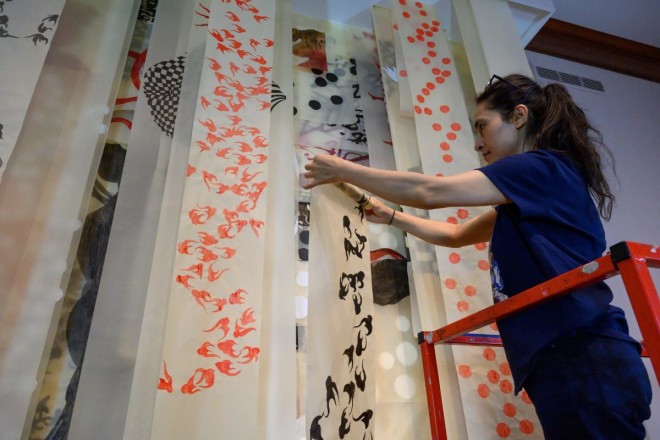
Pioneering Pakistani American, Shahzia Sikander, is one of the most influential artists working today. Sikander is widely celebrated for expanding and subverting pre-modern and classical Central and South-Asian manuscript (miniature) painting traditions and launching the form known today as neo-miniature. By bringing traditional and historical practice into dialogue with contemporary international art practices, Sikander’s multivalent and investigative work examines colonial archives to readdress orientalist narratives in western art history. Interrogating ideas of language, trade, empire, and migration through imperial and feminist perspectives Sikander’s paintings, video animations, mosaics and sculpture explore gender roles and sexuality, cultural identity, racial narratives, and colonial and postcolonial histories.
Sikander earned a B.F.A. in 1991 from the National College of Arts in Lahore, Pakistan. Her seminal thesis work, The Scroll (1989–1990) which initiated the start of the neo-miniature movement, garnered awards, exhibitions and press and led to increased enrollment in the NCA’s miniature painting department. Subsequently, Sikander was appointed as a lecturer in miniature painting at NCA in 1992. The artist moved to the United States to pursue an M.F.A. at the Rhode Island School of Design from 1993 to 1995; from 1995 to 1997, she participated in the Glassell School of Art’s CORE Program at The Museum of Fine Arts, Houston. A recipient of a MacArthur Fellowship (2006) and the State Department Medal of Arts (2012), Sikander’s innovative work has been exhibited and collected internationally.
Shahzia Sikander is currently a subject of a traveling exhibition titled Shahzia Sikander: Extraordinary Realities. The exhibition runs at The Morgan Library in New York June, 18 – September 26, 2021 and travels to the RISD Museum, Rhode Island in November 2021, and MFA Houston, Texas in March 2022. On the occasion of these exhibitions, there is a new monograph printed charting her early development as an artist in Lahore and the United States, and foregrounding her critical role in bringing manuscript painting into dialogue with contemporary art. Edited by Jan Howard and Sadia Abbas, with contributions by Gayatri Gopinath, Faisal Devji, Kishwar Rizvi, Sadia Abbas, Jan Howard, Vasif Kortun, Dennis Congdon, Bashir Ahmed, Rick Lowe, and Julie Mehretu.
New York Studio School Evening Lectures are free and open to the public. Your generous support enables us to highlight contemporary artists, art historians, critics and thinkers through these essential dialogues. Please consider making a gift today.